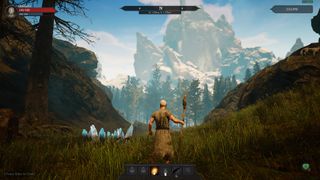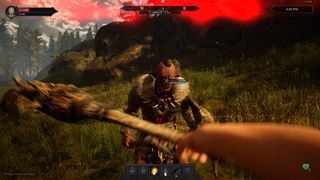Why Citadel: Forged with Fire has no hunger and thirst system—and why it someday might
The developers feel eating and drinking is a chore that "gets in the way of the fun stuff." For now, at least.

My opening moments in Citadel: Forged with Fire will sound familiar to anyone who has played a survival game in the past few years. I awaken in a mysterious cave and spend a few moments holding my arms up before me, examining them in wonder as if seeing them for the first time (I suppose, technically, I am). Having inspected my arms, I begin running around, my eyes pointed at the ground, gathering wood, rocks, plants, mushrooms, crystals, and pretty much anything else I can find on the ground, pausing with each discovery to open a menu and see what I might craft or build with my growing collection.
One thing that is immediately different about Citadel, however, is what's missing: there are no meters for hunger, thirst, and stamina, the sort of systems we've come to expect from Early Access multiplayer open world games. Citadel has magic and spellcasting, crafting and building, creature taming and riding, combat and exploration, but no need to eat or drink. I spoke to managing director Alex Tintor of Blue Isle Studios, developer of Citadel: Forged with Fire, about the decision to not include hunger and thirst in the game.
"A year ago, we seriously considered those systems," said Tintor, "and we had a lot of conversations in the studio about it, and we've played all the games that have those systems. And we kind of felt it's a little bit of a chore and it gets in the way of the fun stuff. Our game has dragons that you can ride on the back of and breathe fire on a castle, you can get on a broomstick and go raid in caves and go nuts in our game, and eating and some of those chore-like elements just got in the way of that, and we just said, why would we block the users from getting to the fun stuff? Let's just let 'em have at it and explore the world."

Since I don't think most games do hunger and thirst very well, and I find stamina—at least when its relegated to simple sprint meters—particularly irritating, I'm pretty happy to be playing Citadel without having to fill my stomach, hydrate myself, or slow down every few seconds to recover from sprinting. However, while these systems aren't in the game now, there's a possibility they may someday be added, depending on what kind of community feedback developer Blue Isle receives during the estimated year Citadel will spend in Early Access.
"We decided to move away from [hunger and thirst] for launch because we frankly think it's better, we think it's more fun this way," Tintor said. "But if this is what people really want to see more of then we'll certainly deliver that content."
I asked Tintor about the reality of Early Access feedback helping to shape a game. For players, it's one of the benefits of Early Access, since it gives them a chance to make suggestions, and it can be helpful for developers to add new features or modify existing ones based on feedback. But if a developer's ultimate vision for a game simply doesn't include something like a hunger and thirst system, should they really be swayed to add it because the community wants it?
"It definitely can be tricky," Tintor said. "But really, our vision for this game is more about the experiences you have and the social relationships you build and the things you create as a user. So this game is less about hard designer rules that we set, and [we don't] say: No, you must play the game the way we the designers say so."
PC Gamer Newsletter
Sign up to get the best content of the week, and great gaming deals, as picked by the editors.
"So the game is not built in a very rigid way, and me saying that we're prepared to add different gameplay elements to satisfy the playerbase is really just me saying, we want as many people playing this game as possible, because we just really want to see stories and the intrigue and the drama that unfolds within the game itself. And if adding those systems is going to foster that, it's something that we're very comfortable doing."

As for my first taste of drama and conflict in Citadel, it's not something bards will someday sing of: I spot a blue fairy, run over to it, and punch it in the face until it's dead. Soon after my brutal, bare-fisted murder of the woodland sprite, I unlock a wand and a staff, and enchant them with the spells I've unlocked: the wand lets me fire a crackling magic missile, while the staff can launch an explosive fireball. My spree continues as I kill elk and hares with my new spells, and then fight some wolves, harvesting their corpses for more crafting ingredients. I'm aware Citadel has invited some comparisons to Ark (I sort of did it myself in my opening paragraph) but even in the early hours, I'm feeling more like a wizard than like one of Ark's axe-wielding cavemen.
While there is no hunger and thirst, there are still meters to keep filled, like health and especially mana, which drains as I fling fireballs at Blood Orcs I stumble across. With my magic depleted, I'm forced to use my staff as a melee weapon and wind up face-down in the grass. Nicely, respawning after death allows me to keep my wand and staff and their enchantments—another difference from the many survival games that strip you of every single possession when you die.
During my admittedly short time playing, I haven't run into other players yet (though there were almost a dozen on the server I joined) and I haven't progressed far enough yet to make an attempt at building. My connection to the server was a bit wobbly from time to time, but Blue Isle have released one patch to improve server stability already, and I'm told another will be along soon, along with new creatures, spells, and abilities.
On a personal note, I hope the majority of community doesn't want hunger, thirst, and stamina added to Citadel: Forged with Fire. It's quite refreshing to romp around in an Early Access open world with a few less chores to complete.

Chris started playing PC games in the 1980s, started writing about them in the early 2000s, and (finally) started getting paid to write about them in the late 2000s. Following a few years as a regular freelancer, PC Gamer hired him in 2014, probably so he'd stop emailing them asking for more work. Chris has a love-hate relationship with survival games and an unhealthy fascination with the inner lives of NPCs. He's also a fan of offbeat simulation games, mods, and ignoring storylines in RPGs so he can make up his own.
Most Popular

